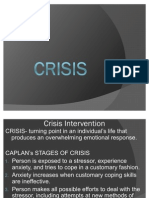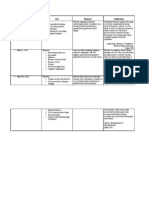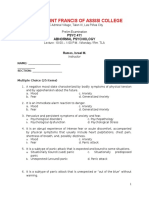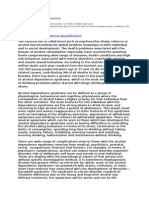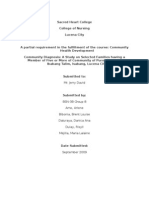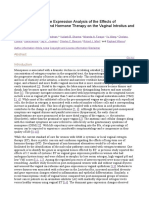Defense Mechanisms
Defense Mechanisms
Uploaded by
Eiziddeen IsmailCopyright:
Available Formats
Defense Mechanisms
Defense Mechanisms
Uploaded by
Eiziddeen IsmailCopyright
Available Formats
Share this document
Did you find this document useful?
Is this content inappropriate?
Copyright:
Available Formats
Defense Mechanisms
Defense Mechanisms
Uploaded by
Eiziddeen IsmailCopyright:
Available Formats
Defense Mechanisms
What are psychological defense mechanisms?
They are psychological strategies used by individuals (and by extension--groups of individuals and even entire nations at times) to cope with reality and to maintain his/her self -image intact.
I. Level 1 Defense Mechanisms: - Almost always pathological;
for the user these three defenses permit someone to rearrange external reality (and therefore not have to cope with reality); for the beholder, the users of these mechanisms frequently appear crazy or insane. These are the "psychotic" defenses, common in overt psychosis, in dreams, and throughout childhood. They include:
A. Denial: a refusal to accept external reality because it is too
threatening. Person not admits the painful intolerant external reality and so what can not be perceived do not exist and so can not be painful. There are examples of denial being adaptive (for example, a mother of a child with mental retardation denying that her child is sick. On the pathological level (when denial distort the reality) as in schizophrenic subject deny the presence of his mother
B. Distortion: a gross reshaping of external reality to meet internal
needs. Unrealistic megalomaniac beliefs, or wish fulfilling delusions are examples of such defense mechanism.
C. Delusional Projection: perceiving and reacting to unacceptable
inner impulses as outside the self. Frank delusion, usually of a persecutory nature, about external reality is a pathological example of projection defenses.
II. Level 2 Defense Mechanisms: are seen frequently in adults
and are common in adolescents. For the user these mechanism alter distress and anxiety caused by reality or other people; while for the beholder, people who use such defenses are seen as socially undesirable, immature, difficult and out of touch. They are considered "immature" defenses and almost always lead to serious problems in a person's ability to cope with the world. They include:
A. Fantasy: tendency to retreat into fantasy in order to resolve
inner and outer conflicts
B. Projection: attributing one's own unacknowledged feelings to
others; includes severe prejudice, severe jealousy, hypervigilance to external danger, and rejection of intimacy through suspiciousness.
C. Hypochondriasis: the transformation of negative feelings
towards others into negative feelings toward self.
D. Passive Aggressive Behavior: aggression towards others
expressed indirectly and ineffectively through passivity. E.g. forgetting of appointment of a one you do not like.
E. Acting Out Behavior: direct expression of an unconscious wish
or impulse to avoid being conscious of the emotion that accompanies it. So it is responsible on gratifying the impulses more than stopping it.
III. Level 3 Defense Mechanisms: are often considered
"neurotic, they can have short-term advantages in coping, but they often cause long-term problems in relationships, work, and enjoyment of life for people who primarily use them as their basic style of coping with the world. They include:
A. Repression: unconscious forgetting of painful experience
causing guilt or tension. It differ from the usual forgetting as it is an active mental process that require mental energy and it can still direct the behavior unconsciously. E.g. repressed self-punishment by loosing self-objects.
B. Reaction Formation: expression of the reverse of one's real
impulses. The behavior will be completely the opposite of what one really wants or feels (e.g., taking care of someone when what one really wants is to be taken care of; studying to be a pilot to cover-up being afraid to fly).
C. Displacement: separation of emotion from its real object and
redirection of the intense emotion toward someone or something that is less offensive or threatening.
D. Regression: a defense mechanism in which you flee from reality
by assuming a more infantile state. It is a return to a previous stage of development to avoid the anxiety involved in later stages. The use of the "immature Defenses" (Levels 1, 2, 3) is
related to:
1. Poor adjustment as an adult 2. Higher divorce rates and marital discord 3. Poor friendship patterns 4. Higher incidence of mental illnesses 5. Greater number of sick leave days taken 6. Poorer general health
IV. Level 4 Defense Mechanisms: are common among most
"healthy" adults and are considered the most "mature". Use of these defenses gives the user pleasure and feelings of mastery. They include:
A. Sublimation: change the aims from a socially objectionable one
to a socially valued one. It leads to transformation of negative emotions or instincts into positive actions, behavior, or emotion e.g. art, sports, hobbies, or even one's choice of profession
B. Altruism: constructive service to others that brings pleasure and
personal satisfaction
C. Suppression: the conscious decision to delay paying attention to
an emotion or need in order to cope with the present reality; able to later access the emotion and accept it.
D. Anticipation: realistic planning for future discomfort E. Humor: overt expression of ideas and feelings (especially those
that are unpleasant to focus on or too terrible to talk about) without personal discomfort and without unpleasant effect on others.
The use of the "mature defenses" (Level 4) is related to: 1. Excellent adjustment as an adult 2. Happiness (by self-report) 3. Job satisfaction 4. Rich friendships 5. Fewer hospitalizations over life 6. Better overall health 7. A lower incidence of mental illness.
When is a defense mechanism considered really "adaptive" and when is it considered "pathological"? What we call "mental illness" is actually a manifestation of an individual's pathological adaptive response to events in his/her life. Here is what makes a defense "pathological":
1. 2. 3. 4. 5.
the defense is used in a rigid, inflexible, and exclusive manner the motivation for using the defense comes more from past needs than present or future reality the defense severely distorts the present situation use of the defense leads to significant problems in relationships, functioning, and enjoyment of life use of the defense impedes or distorts emotions and feelings, instead of rechanneling them effectively
You might also like
- There Are Several Causes of DIDDocument6 pagesThere Are Several Causes of DIDZainab RashidNo ratings yet
- Sports Event Management System Project Report PDFDocument98 pagesSports Event Management System Project Report PDFGobi Krishnan25% (4)
- PPE 310 - L2 Assignment - Choose My Plate:PDFDocument8 pagesPPE 310 - L2 Assignment - Choose My Plate:PDFJ BatayolNo ratings yet
- The Silver Lining PlaybookDocument4 pagesThe Silver Lining PlaybookJanine Dela CruzNo ratings yet
- CrisisDocument13 pagesCrisisAngel Gaddi LarenaNo ratings yet
- Mental Status Exam ERICDocument3 pagesMental Status Exam ERICDesiree AfagaNo ratings yet
- Schizophrenia and Other Psychoses: Psychosis - Is A Disruptive Mental State inDocument7 pagesSchizophrenia and Other Psychoses: Psychosis - Is A Disruptive Mental State inDhen MarcNo ratings yet
- CHAPTER 16 - Schizophrenia 2Document15 pagesCHAPTER 16 - Schizophrenia 2Rebecca100% (1)
- 3.shutter Island Movie AnylysisDocument33 pages3.shutter Island Movie AnylysisyashNo ratings yet
- Split ReportDocument23 pagesSplit Reportjomer ryanNo ratings yet
- Dissociative Identity DisorderDocument4 pagesDissociative Identity DisorderalfredNo ratings yet
- Reaction Paper 1Document4 pagesReaction Paper 1api-437157249No ratings yet
- Mood Stabilizing Drugs-Daga, JaDocument19 pagesMood Stabilizing Drugs-Daga, JaJoel Andrew Java DagaNo ratings yet
- MseDocument11 pagesMseClyde R.OrtegaNo ratings yet
- Are Viruses AliveDocument2 pagesAre Viruses AliveRobert Joseph NikolaiNo ratings yet
- SG3 - Case Analysis Manuscript - PTSD 1Document132 pagesSG3 - Case Analysis Manuscript - PTSD 1Karl Angelo MontanoNo ratings yet
- NCP PsychDocument7 pagesNCP PsychScarletNo ratings yet
- SchizophreniaDocument5 pagesSchizophreniaapi-3765584100% (3)
- Glasgow Coma ScaleDocument3 pagesGlasgow Coma Scaletoto11885No ratings yet
- Remedial Exam PsychDocument7 pagesRemedial Exam PsychPrince Rener Velasco PeraNo ratings yet
- "Monograph Eating Disorders": StudentDocument12 pages"Monograph Eating Disorders": StudentTeffy NeyraNo ratings yet
- Time Chart 7:00-3:00 PM F Ineffective Individual Coping Related To SituationalDocument1 pageTime Chart 7:00-3:00 PM F Ineffective Individual Coping Related To SituationalAziil LiizaNo ratings yet
- Maladaptive Patterns of BehaviorDocument97 pagesMaladaptive Patterns of BehaviorKimTot OctavianoNo ratings yet
- Fdar PsycheDocument1 pageFdar PsycheAziil LiizaNo ratings yet
- A Reaction Paper On Movie: A Beautiful MindDocument4 pagesA Reaction Paper On Movie: A Beautiful MindTrixie Al Marie100% (2)
- Mental StatusDocument8 pagesMental StatusAbdullah Mascardo BarabagNo ratings yet
- Psych Lec PDFDocument41 pagesPsych Lec PDFKimberly Ann BoricanoNo ratings yet
- Beautiful MindDocument6 pagesBeautiful Mindapi-285003633No ratings yet
- OlanzapineDocument3 pagesOlanzapineLeris Luigi VictorioNo ratings yet
- Nursing Prioritization and NCP (Bataan)Document7 pagesNursing Prioritization and NCP (Bataan)Rudy Mark ReyesNo ratings yet
- NCPDocument4 pagesNCPJoseph Dableo ParreñoNo ratings yet
- Case StudyDocument15 pagesCase Studyapi-589548099No ratings yet
- Care of Patients With Maladaptive Patterns of Behavior: Psychiatric Mental Health Nursing 8 Edition Sheila VidebeckDocument45 pagesCare of Patients With Maladaptive Patterns of Behavior: Psychiatric Mental Health Nursing 8 Edition Sheila VidebeckGrape JuiceNo ratings yet
- Nursing Care Plan For Mentally ChallengeDocument2 pagesNursing Care Plan For Mentally ChallengeAbdullah Mascardo Barabag0% (1)
- CH 7 MseDocument20 pagesCH 7 MseIyanna BaylonNo ratings yet
- Cefoxitin and Ketorolac Edited!!Document3 pagesCefoxitin and Ketorolac Edited!!Bryan Cruz VisarraNo ratings yet
- Defense MechanismDocument18 pagesDefense MechanismAqsa Gulzar100% (2)
- Our Lady of Fatima UniversityDocument2 pagesOur Lady of Fatima UniversityAllisson BeckersNo ratings yet
- Schizophrenia: Signs and SymptomsDocument38 pagesSchizophrenia: Signs and SymptomsRatu Nurul Fadhilah100% (1)
- Monsalud - Drug StudyDocument5 pagesMonsalud - Drug StudyJanielle Christine MonsaludNo ratings yet
- Resource-Manual OB WARDDocument3 pagesResource-Manual OB WARDHarvey Lampa SelimNo ratings yet
- A Beautiful MindDocument4 pagesA Beautiful MindRahmaNo ratings yet
- Midterm Exam (Abpsych)Document7 pagesMidterm Exam (Abpsych)EsraRamosNo ratings yet
- Visual Concept Map of Abnormal PsychologyDocument14 pagesVisual Concept Map of Abnormal Psychologyapi-253430028No ratings yet
- Process RecordingsDocument4 pagesProcess RecordingsJayakrishnan P KripNo ratings yet
- Defense MechanismDocument5 pagesDefense MechanismRaiza Love Caparas-Pablico0% (1)
- Agoraphobia in Adults - Epidemiology, Pathogenesis, Clinical Manifestations, Course, and Diagnosis PDFDocument8 pagesAgoraphobia in Adults - Epidemiology, Pathogenesis, Clinical Manifestations, Course, and Diagnosis PDFdreamingNo ratings yet
- Mental HealthDocument31 pagesMental HealthJoshuaNo ratings yet
- Bulimia Nervosa: Signs and SymptomsDocument4 pagesBulimia Nervosa: Signs and Symptomseneg4530No ratings yet
- DS - CatapresDocument2 pagesDS - CatapresDOni CorleoneNo ratings yet
- Psychia Ncp-MetchelDocument9 pagesPsychia Ncp-MetchelCarmelita SaltNo ratings yet
- Paranoid SchizophreniaDocument26 pagesParanoid SchizophreniaCrisha Ann Billones BacutaNo ratings yet
- Impaired Tissue Integrity - CellulitisDocument3 pagesImpaired Tissue Integrity - CellulitisKelvin Kurt B. AgwilangNo ratings yet
- MSEDocument20 pagesMSEJenny YenNo ratings yet
- That All Relevant Boxes Are Completed, Otherwise Assignments Cannot Be Processed EfficientlyDocument11 pagesThat All Relevant Boxes Are Completed, Otherwise Assignments Cannot Be Processed EfficientlyFareeha UmarNo ratings yet
- Drug StudyDocument8 pagesDrug StudyLj PingoyNo ratings yet
- Alcohol Dependence SyndromeDocument3 pagesAlcohol Dependence SyndromeMohd AminuddinNo ratings yet
- CDXDocument12 pagesCDX__________________________No ratings yet
- MseDocument5 pagesMseYnaffit Alteza UntalNo ratings yet
- Defence MechanismDocument13 pagesDefence MechanismMaheshNo ratings yet
- Defense Mechanism: Definitions of Individual Psyche StructuresDocument7 pagesDefense Mechanism: Definitions of Individual Psyche StructuresAnitha sujithNo ratings yet
- General information-RCHRM2S41 - WWW - Ecusam.irDocument48 pagesGeneral information-RCHRM2S41 - WWW - Ecusam.irRonald VelascoNo ratings yet
- Hepatic Disorders: Prepared by Captain: Jumana AL-Momani RN - MSNDocument72 pagesHepatic Disorders: Prepared by Captain: Jumana AL-Momani RN - MSNJanuaryNo ratings yet
- Riza 2015Document14 pagesRiza 2015Jonathan SoeNo ratings yet
- PTH 710-Womens Pelvic Girlde Health Business PlanDocument23 pagesPTH 710-Womens Pelvic Girlde Health Business Planapi-621599790100% (1)
- Chapter Eight Measurement of Variables: Operational DefinitionDocument3 pagesChapter Eight Measurement of Variables: Operational DefinitionKevin MothaNo ratings yet
- DS - Calibrator For Oil Breakdown Voltage Testers DPA 75 C + DTA 100 C - KA DPA-DTA C - BAUR - En-GbDocument2 pagesDS - Calibrator For Oil Breakdown Voltage Testers DPA 75 C + DTA 100 C - KA DPA-DTA C - BAUR - En-GbthumbaibalaNo ratings yet
- Analytical Exposition: (THESIS) The Problem of Traffic Jams Is Not Foreign To Our Ears. in A NumberDocument3 pagesAnalytical Exposition: (THESIS) The Problem of Traffic Jams Is Not Foreign To Our Ears. in A NumberYehezkiel SimamoraNo ratings yet
- Cdi 4 Drug Education and Vice Control 2013Document41 pagesCdi 4 Drug Education and Vice Control 2013Jhezzie Gutierrez100% (1)
- 2125 Super Ace Brochure Hi ResDocument4 pages2125 Super Ace Brochure Hi ResAryaDkNo ratings yet
- OC95 GuidelineonUsageofUPIAPIsDocument3 pagesOC95 GuidelineonUsageofUPIAPIsAnupam GuptaNo ratings yet
- Mechanical VentilationDocument16 pagesMechanical VentilationBhawna JoshiNo ratings yet
- General Chemistry Q4 M3Document14 pagesGeneral Chemistry Q4 M3Brhian DianaNo ratings yet
- Drill Stem Test 2Document17 pagesDrill Stem Test 2Suleiman BaruniNo ratings yet
- Eaton Ups Life Cycle Checklist Brochure SER110FXADocument1 pageEaton Ups Life Cycle Checklist Brochure SER110FXAjusebertNo ratings yet
- Management of QualityDocument3 pagesManagement of QualityজহিরুলইসলামশোভনNo ratings yet
- Contractor Environmental, Health and Safety Evaluation FormDocument13 pagesContractor Environmental, Health and Safety Evaluation Formsainukala100% (2)
- Sensedge Technical Specifications - 202109Document8 pagesSensedge Technical Specifications - 202109Dương Tiến TháiNo ratings yet
- Group 3 Beed 3a Thesis 1 1 1Document54 pagesGroup 3 Beed 3a Thesis 1 1 1Angel D. BaybayanNo ratings yet
- Topic2 Transaction Processing Part 2Document15 pagesTopic2 Transaction Processing Part 2Nurul Irdina SyazwinaNo ratings yet
- College Algebra 12th Edition by Lial Hornsby Schneider and Daniels ISBN Test BankDocument52 pagesCollege Algebra 12th Edition by Lial Hornsby Schneider and Daniels ISBN Test Bankedward100% (33)
- Evaluative Tool COPARDocument8 pagesEvaluative Tool COPARrlinaoNo ratings yet
- OX2 231 Oxygen Permeability TesterDocument3 pagesOX2 231 Oxygen Permeability Testerqualityc711No ratings yet
- Craniofacial and Dental Developmental Defects Diagnosis and Management PDFDocument131 pagesCraniofacial and Dental Developmental Defects Diagnosis and Management PDFMircea Oprea100% (1)
- Management of Traumatic Cervical Spondyloptosis: Hitesh Inder Singh Rai Kanwaljeet Garg Deepak AgrawalDocument5 pagesManagement of Traumatic Cervical Spondyloptosis: Hitesh Inder Singh Rai Kanwaljeet Garg Deepak AgrawalTrina ViskhawatNo ratings yet
- UntitledDocument157 pagesUntitledPooja UdupaNo ratings yet
- Chapter 2 - Gross Estate PDFDocument6 pagesChapter 2 - Gross Estate PDFVanessa Castor GasparNo ratings yet
- Histological and Gene Expression Analysis of The Effects of Menopause Status and Hormone Therapy On The Vaginal Introitus and Labia MajoraDocument34 pagesHistological and Gene Expression Analysis of The Effects of Menopause Status and Hormone Therapy On The Vaginal Introitus and Labia MajoraDomenico FeleppaNo ratings yet
- Trane Cassette AcDocument8 pagesTrane Cassette AcVihan indiaNo ratings yet
- PSM EDITED PROFORMA Epidemiological Case History PDFDocument28 pagesPSM EDITED PROFORMA Epidemiological Case History PDFPramila MahaleNo ratings yet




